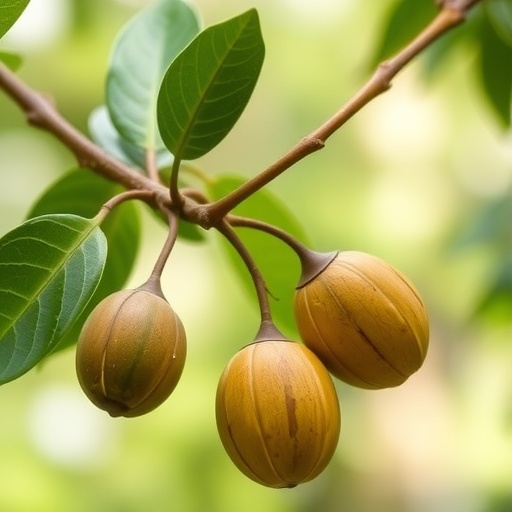The underutilized crop Cyperus esculentus, commonly known as tiger nut, is gaining attention as a resilient agricultural species that thrives in various climatic conditions. This drought-resistant tuber is not only economically significant but also plays a crucial role in sustainable agriculture. As climate change intensifies its effects globally, researchers are keenly interested in understanding its potential for cultivation in Togo, West Africa, a region that could significantly benefit from expanding its agricultural diversity. The study conducted by Palanga, Bawa, and Ayena addresses the impacts of climate change on the potential suitable areas for tiger nut cultivation.
In recent years, the urgency surrounding climate change has led to heightened research efforts to model its effects on various crops. The study focused on Cyperus esculentus, a crop that has been largely overlooked yet has numerous health benefits, such as being rich in fiber, vitamins, and minerals. These insights into its nutritional profile make it a potential candidate for addressing food security issues in regions most vulnerable to climatic variations. The research emphasizes the importance of understanding the crop’s adaptive abilities within changing ecosystems.
The researchers employed advanced modeling techniques to assess how climatic factors such as temperature and precipitation patterns may alter the habitats suitable for tiger nut cultivation. By integrating various climate models, the study predicts shifts in agro-ecological zones that would directly impact where tiger nut can be effectively grown. The findings suggest that regions that were previously unsuitable may become viable due to changing climatic conditions, thus presenting new opportunities for farmers.
One particularly notable aspect of the study is the identification of specific areas within Togo that could become key cultivation zones for tiger nut. The research utilized a combination of geographic information system (GIS) tools and climate projections to determine these areas. The robustness of this approach allows for a nuanced understanding of potential agricultural expansion in response to climate change, enabling targeted efforts in conservation and cultivation strategies.
Additionally, the study explores not only the suitable areas for cultivation but also the socio-economic implications of expanding tiger nut farming in Togo. By increasing the area under cultivation, there is the possibility of enhancing local economies, providing job opportunities, and promoting food security. The authors discuss how integrating tiger nut into local farming practices could diversify income sources for farmers who are vulnerable to the fluctuations of traditional crops.
The implications of climate change extend beyond agriculture; they touch on the cultural and traditional practices of communities reliant on local crops. The revival of interest in underutilized crops such as tiger nut can lead to a rediscovery of agricultural heritage, fostering a sense of identity and continuity in food practices among local populations. This cultural angle adds depth to the urgency of introducing tiger nut as a staple in Togo.
Moreover, the nutritional advantages of tiger nut can play a significant role in enhancing the health of local populations. As global dietary needs evolve and the threat of malnutrition looms, underutilized crops like Cyperus esculentus can fill critical gaps in nutrient delivery. The availability of a healthy, versatile food source is essential not only for individual well-being but also for the overall resilience of the community in the face of climate challenges.
The research also discusses the environmental benefits of promoting tiger nut cultivation. Given its drought-resistance and low input needs, tiger nut can be an effective component in sustainable land management practices. Increased cultivation could contribute to improved soil health and biodiversity, which are vital in alleviating some of the adverse effects of climate change. The authors argue that the integration of such underutilized crops into agricultural systems can create more sustainable farming practices.
The study stands as a clarion call for policymakers to consider underutilized crops in agricultural planning. As climate change continues to reshape agricultural landscapes, crop diversification should be a priority. The insights gained from this research could guide initiatives aimed at promoting food systems that are resilient to environmental changes, ultimately enhancing both agricultural productivity and ecological balance.
In light of the findings, the authors advocate for targeted research and investment in regions identified as suitable for tiger nut cultivation. This would not only support farmers but also ensure that local communities are equipped to adapt to changing climatic conditions. Engaging farmers in the research process can facilitate better understanding and faster adoption of new agricultural practices, ensuring that the transition towards more sustainable options is both fruitful and equitable.
Ultimately, the study by Palanga and colleagues emphasizes the interconnectivity of agriculture, climate change, and community resilience. By centering discussions around underutilized crops like tiger nut, there lies an opportunity to reshape food systems, enhance nutritional outcomes, and pave the way for a more sustainable agricultural future. The insights gleaned from this research are poised to be instrumental in embracing adaptability and fostering long-term agricultural success in Togo and beyond.
In conclusion, the research delivered vital insights for agricultural scientists, policymakers, and farmers alike, underscoring the importance of modeling climate change’s impact on crops. As the stakes rise in the fight against climate change, adapting our agricultural systems to include resilient crops like Cyperus esculentus could be a game-changer for regions susceptible to climate variability.
Subject of Research: Impact of climate change on the cultivation of Cyperus esculentus in Togo, West Africa.
Article Title: Modeling the impact of climate change on suitable areas for the underutilized crop Cyperus esculentus (tiger nut) and implications for production expansion and conservation in Togo, West Africa.
Article References:
Palanga, K.K., Bawa, A., Ayena, J.I.K. et al. Modeling the impact of climate change on suitable areas for the underutilized crop Cyperus esculentus (tiger nut) and implications for production expansion and conservation in Togo, West Africa.
Discov Agric 3, 99 (2025). https://doi.org/10.1007/s44279-025-00276-7
Image Credits: AI Generated
DOI: https://doi.org/10.1007/s44279-025-00276-7
Keywords: Cyperus esculentus, climate change, agricultural expansion, Togo, sustainability, food security, crop diversification.




